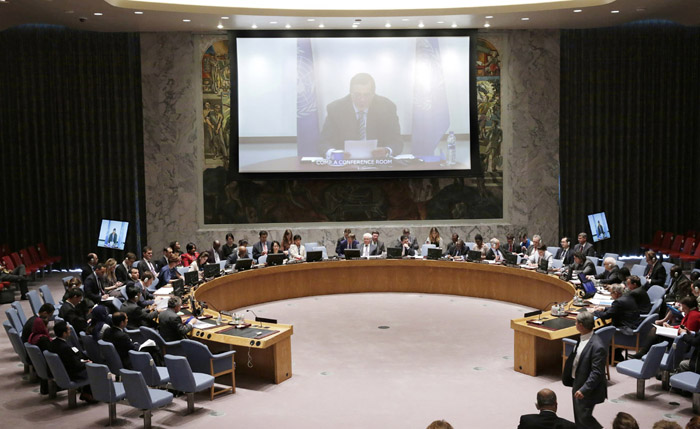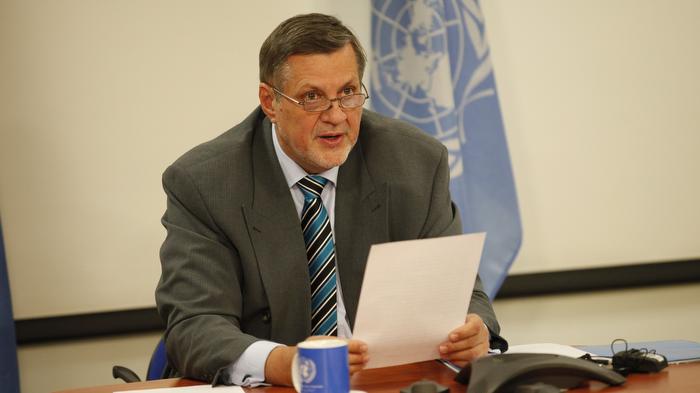KABUL - At a meeting of the United Nations Security Council today, the world body’s top envoy in Afghanistan, Ján Kubiš, said that addressing the political impasse in the wake of the country’s recent Presidential run-off elections will be vital for its unity and stability and that the onus for dealing with the situation lies with Afghans themselves.“Given rising tensions following the second round (of elections), including increasing ethnic overtones, the utmost maturity and statesmanship is required, notably by the two Presidential candidates,” the Secretary-General’s Special Representative for Afghanistan told the Council meeting at UN Headquarters in New York via video conference from the Afghan capital of Kabul.
“The risk, otherwise, is a confrontation of the two candidates and their supporters, where the losing side will reject the results and contest their legitimacy,” Mr. Kubiš said. “That might lead to protracted confrontation with a danger of a slide into violence. Afghanistan can ill-afford these unpredictable impacts on security, stability, their economy and the wider region.”
In the run-off elections held on 14 June, Afghan voters had a choice between Dr. Abdullah Abdullah and Dr. Ashraf Ghani Ahmadzai to replace the President Hamid Karzai to lead the country. The two candidates emerged after the first round of the poll on 5 April saw no candidate gain the 50 per cent plus one of the total number of votes needed to become the President.
UN officials have previously described the elections as being critical to the country’s stability and continued international support.
Days after the run-off vote, Dr. Abdullah announced the suspension of his campaign’s involvement in the Afghan-led and -managed elections process, called for a halt to that process and raised the possibility of a commission to settle poll-related disputes under UN supervision. In remarks last Friday, President Hamid Karzai had echoed Dr. Abdullah’s suggestion of a possible UN role as one of two options to address the political impasse.
On Tuesday, in the wake of the resignation of the IEC’s chief electoral officer, the UN Assistance Mission in Afghanistan (UNAMA), which is headed by Mr. Kubiš, facilitated a meeting between the Independent Election Commission and Dr. Abdullah – the encounter allowed for an exchange of views and included all of the IEC Commissioners and Dr. Abdullah and his electoral advisers. UNAMA has been encouraging the Presidential candidates to fully engage in the electoral process and cooperate with each other and with the electoral institutions.
In today’s briefing to the 15-member Council, Mr. Kubiš said that the UN’s role in addressing Afghanistan’s current political impasse is limited.
The Secretary-General’s Special Representative for Afghanistan, Ján Kubiš, told the Council meeting at UN Headquarters in New York via video conference from the Afghan capital of Kabul. Photo: Evan Schneider / UN
----------------------------------------------------------
“We can facilitate Afghan parties reaching solutions, we can provide technical expertise to advise on the possibilities and modalities of strengthened checks and balances where there are questions over the process,” he said. “What we cannot do is prepare solutions and decide on behalf of Afghans – that is the exclusive responsibility of Afghans. The United Nations’ efforts assist Afghan institutions and stakeholders, we cannot substitute for them or replace them.”
Citing institutional bias and substantial fraud, Dr. Abdullah’s supporters have taken to the streets over the past week. There have been reports of sporadic violence and clashes.
Mr. Kubiš warned that, in such times of tension, "missteps, miscommunications, misunderstandings and the actions of a radical few" can have broader consequences. He noted that the country’s political class, especially the two candidates, “holds the paramount responsibility to manage the situation.”
“I appeal for calm amongst both candidates’ supporters amidst sharpening, hateful rhetoric of an increasingly inflammatory tone, risking ethnic division. Most disturbingly, this includes rhetoric evoking memories of the fratricidal, factional conflicts in the 1990s,” the UN envoy stated. “The candidates urgently need to be cooperating with one another to prevent such scenarios that unfortunately cannot be excluded for now.”
Another key topic Mr. Kubiš covered in his Council briefing was the need for continued international support to Afghanistan, adding that this all depends on “Afghanistan’s political leaders and institutions breaking the electoral impasse and the completion of political transition in an orderly and timely manner.”
There will be a series of high-level meetings over coming months centred on international support for Afghanistan, for which the Special Representative noted a “strong Afghan lead” will be needed.
As Afghan people and Muslims all over the world prepare to observe the start of the holy month of Ramadan next week, Mr. Kubiš also noted that the occasion, “observed in a spirit of compassion,” can help pave the way for a peaceful and prosperous future of a stable and united Afghanistan.
Earlier this week, UN Secretary-General Ban Ki-moon’s latest report on the situation in Afghanistan was submitted to the Council. The report highlighted a wide range of issues facing the country, including the elections process, peace and reconciliation, human rights, international and regional cooperation, corruption, and humanitarian issues.
On the elections process, Mr. Ban urged the candidates and their supporters to accept the elections’ outcome once all the complaints have been adjudicated in accordance with the law.
“In this post-election period, whoever the winner is, the need is for an inclusive administration drawing on the country’s many diverse elements to best ensure national unity and stability,” the UN chief stated in the report.
[Download the full text of Mr. Kubiš' briefing to the Security Council in - English | Dari | Pashto]






